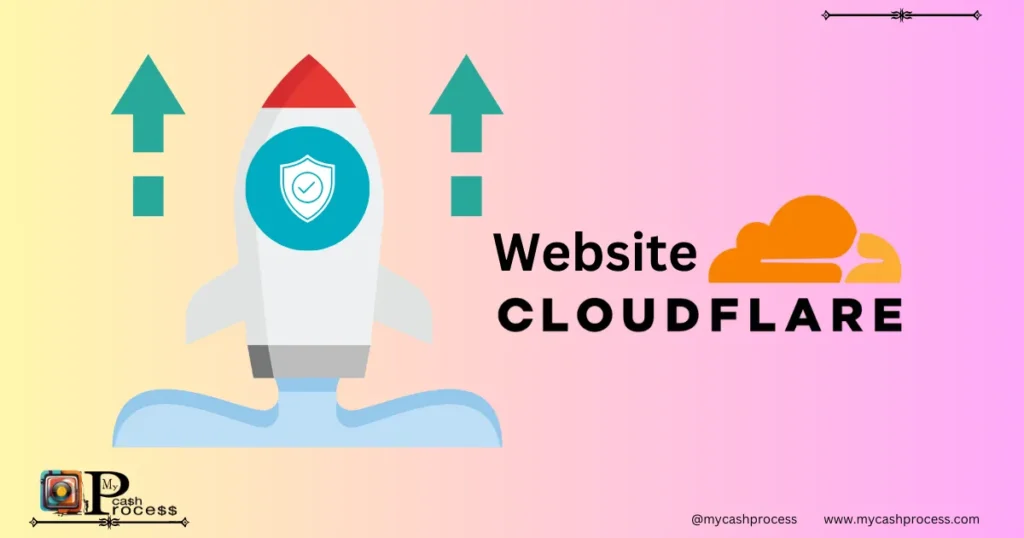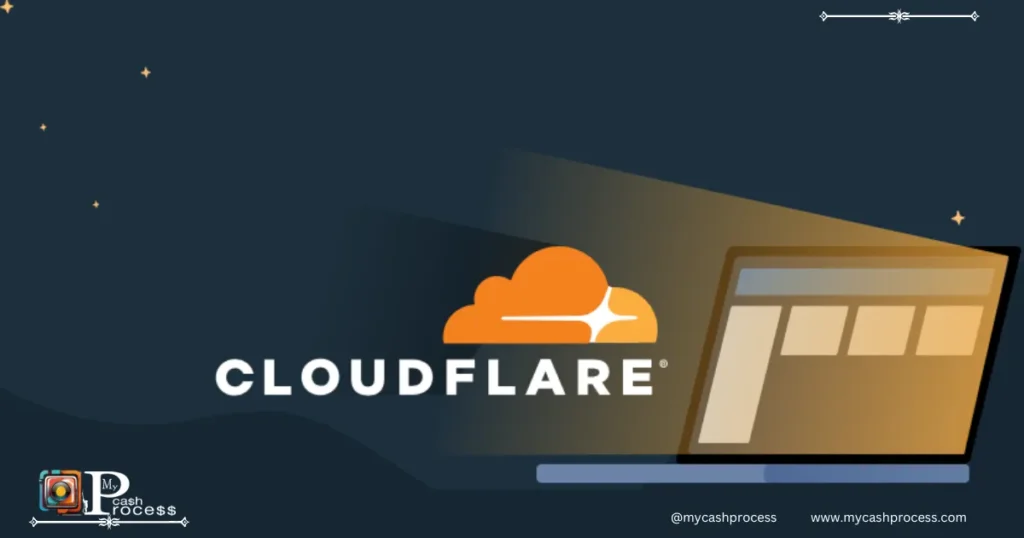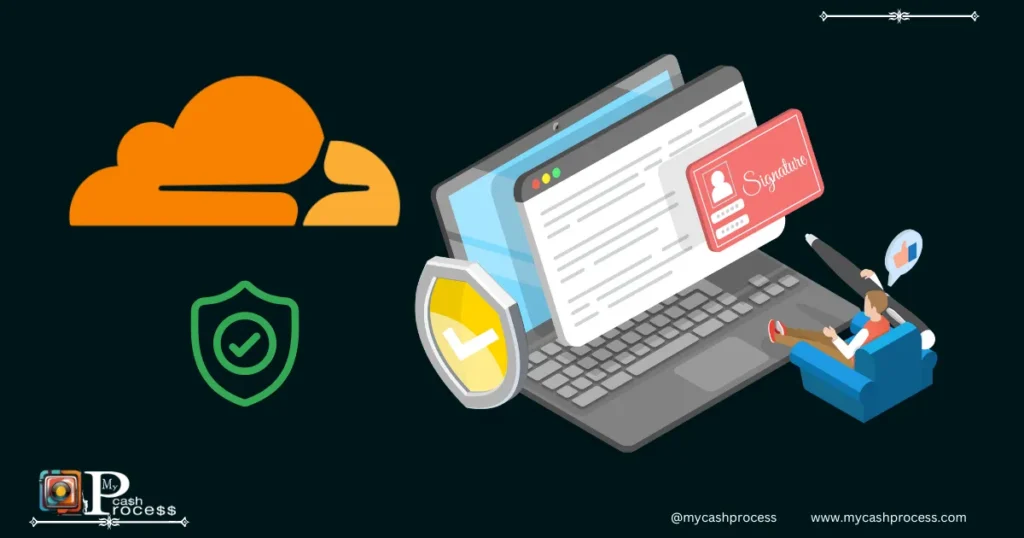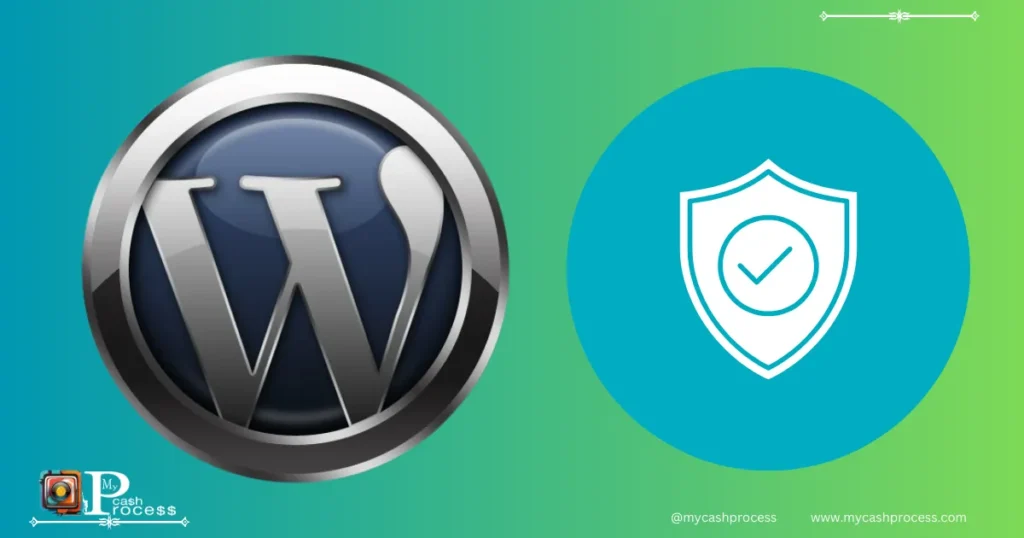1. Introduction: The Importance of Website Security
Website security is one of the most pressing concerns for website owners today. As the digital landscape continues to grow and evolve, so do the threats that can compromise a website’s integrity and security. From hackers and cyber-attacks to malware and data breaches, the risks to your website are many. That’s why website security is crucial for not only protecting sensitive data but also maintaining the trust of your audience and safeguarding your online business operations.
Quick Access Guide
Cloudflare website hosting plays a pivotal role in ensuring that your site remains secure. With increasing cyber threats targeting websites across the globe, having a robust defense mechanism in place is no longer optional; it’s necessary. Through the use of advanced technologies like CDN (Content Delivery Network), WAF (Web Application Firewall), and DDoS protection, Cloudflare website hosting helps protect your site from a range of cyber threats that can damage its performance and reputation.
Securing a website is not a one-time process; it requires continuous vigilance. For site owners, the challenge lies in keeping up with the evolving nature of online security threats and finding reliable tools and services that can enhance their website’s defense mechanisms. This is where Cloudflare website hosting excels.
By leveraging Cloudflare website hosting, website owners can enjoy seamless security features that protect their sites without compromising speed or performance. With an added layer of protection through the website Cloudflare, your site is shielded from malicious traffic, which significantly reduces the chances of successful cyberattacks. Moreover, Cloudflare website hosting provides unmatched scalability and flexibility to grow alongside your website’s needs while maintaining top-notch security.
In this article, we’ll explore how Cloudflare website hosting can boost your site’s security, what makes it an ideal choice for website owners, and how you can get started with Cloudflare to keep your website safe.
2. What is Cloudflare Website Hosting?
Cloudflare website hosting is a cloud-based service designed to protect and optimize websites, offering a combination of security, performance, and reliability. Unlike traditional hosting providers, Cloudflare functions as a reverse proxy between your website and visitors, meaning that all the traffic to your site passes through Cloudflare’s network before reaching your servers. This setup allows Cloudflare website hosting to perform a variety of critical functions that enhance both your site’s security and performance.
Core Features of Cloudflare Website Hosting
- DDoS Protection: One of the primary features of Cloudflare website hosting is its ability to defend against DDoS (Distributed Denial-of-Service) attacks. These attacks flood a website with massive amounts of traffic, causing it to slow down or crash. Cloudflare has a sophisticated infrastructure in place that can mitigate such attacks in real time.
- Content Delivery Network (CDN): Cloudflare website hosting includes a globally distributed CDN that stores cached versions of your site’s content across various locations. This improves site loading speeds by delivering content from the nearest server, reducing latency and ensuring that your visitors have a faster experience, regardless of their geographical location.
- Web Application Firewall (WAF): The Cloudflare website hosting plan includes a WAF that helps block malicious traffic before it even reaches your website. The WAF analyzes incoming traffic and filters out harmful requests based on a set of pre-defined security rules.
- SSL Encryption: Secure Socket Layer (SSL) encryption is crucial for safeguarding data exchanged between your website and its visitors. Cloudflare website hosting makes it easy to implement SSL certificates, ensuring that all traffic between the server and the client is encrypted.
Cloudflare Website Hosting vs. Traditional Hosting
Traditional web hosting provides a server where your website files are stored, but it lacks many of the advanced security features that Cloudflare website hosting offers. While traditional hosting can keep your site up and running, it does not typically offer protections against modern cyber threats like DDoS attacks or automated bots.
By contrast, Cloudflare website hosting focuses on enhancing the overall security and performance of your website by acting as a proxy between the user and the server. It blocks harmful traffic before it ever reaches your website, meaning your site remains protected even if your hosting server is vulnerable.
3. The Role of Cloudflare in Website Security
Cloudflare website hosting is not just about improving website speed; it is also a powerful tool for mitigating cyber threats. By acting as a shield between your website and incoming traffic, Cloudflare is able to filter malicious requests and prevent many types of cyberattacks, keeping your website secure.
How Cloudflare Website Hosting Helps Mitigate Cyber Threats
- DDoS Attack Prevention: Cloudflare website hosting offers one of the most robust defenses against DDoS attacks, which are designed to overwhelm a website’s resources and crash it. Cloudflare’s network can absorb large amounts of traffic and ensure that your website remains up and running, even during an attack.
- Bot Protection: Automated bots can crawl your site, scrape content, or even attempt to breach your website’s security. Cloudflare website hosting includes a set of tools to identify and block suspicious bots before they can reach your site.
- SQL Injection and XSS Protection: Cross-site scripting (XSS) and SQL injection are common attacks that target website vulnerabilities. The Cloudflare website hosting WAF identifies and prevents these attacks, ensuring that your website’s backend remains secure.
- Protection Against Zero-Day Vulnerabilities: Cloudflare website hosting is constantly updated with the latest security patches. It ensures that your website is protected from the latest threats, including zero-day vulnerabilities (unknown security flaws that are exploited before developers can patch them).
- IP Reputation and Traffic Filtering: Cloudflare uses an extensive database of IP addresses to block suspicious or malicious sources. When an attack is detected, Cloudflare website hosting can filter out these harmful IP addresses to prevent them from accessing your website.
Website Cloudflare as a Shield for Your Site’s Data
The integration of website Cloudflare in your security setup ensures that all incoming data is filtered through Cloudflare’s network. This not only improves performance by reducing load times but also ensures that harmful traffic never reaches your website’s server. As such, Cloudflare website hosting serves as a proactive shield for your site’s sensitive data, safeguarding your site from malicious actors.
4. Benefits of Using Cloudflare CDN for Enhanced Website Security
The Cloudflare CDN is a powerful tool for optimizing website security and performance. By caching your website’s static content across a global network of servers, Cloudflare ensures that your website is both fast and secure for all users, regardless of their geographic location.
How Cloudflare CDN Enhances Website Performance and Security
- Faster Load Times: Since Cloudflare CDN stores copies of your website’s content across its network, users are automatically routed to the nearest data center. This reduces latency and improves the load times of your website, providing a better user experience.
- Reduced Server Load: With the help of Cloudflare CDN, the amount of traffic hitting your original server is significantly reduced. By serving cached content to users, Cloudflare CDN lessens the load on your server, ensuring that it can handle more visitors without performance degradation.
- Improved Website Security: Cloudflare CDN provides an additional layer of security by protecting your origin server from direct exposure to the internet. This minimizes the risk of attacks such as DDoS or brute force, which could otherwise overwhelm your server.
Benefits for Websites Using Cloudflare CDN in Canada
Websites in Canada or those catering to Canadian users benefit significantly from Cloudflare CDN. The network of data centers in Canada ensures that Canadian visitors experience faster loading times while maintaining the same high level of security offered by Cloudflare.
5. The Integration of SSL and Cloudflare Website Hosting
One of the key features of Cloudflare website hosting is the seamless integration of SSL (Secure Sockets Layer) certificates, which encrypt all communications between the server and the user’s browser. With the rise of online threats, SSL has become essential for websites handling sensitive data.
Why SSL is Crucial for Website Security
SSL certificates are important because they encrypt data during transmission, making it difficult for attackers to intercept or tamper with information. For websites processing personal information, payments, or login credentials, SSL ensures that all data remains secure.
How Cloudflare Website Hosting Simplifies SSL Implementation
With Cloudflare website hosting, enabling SSL is a straightforward process. Cloudflare offers free SSL certificates to website owners, allowing them to easily encrypt traffic without having to go through complicated procedures or additional costs.
Benefits of SSL with Cloudflare for Better User Trust and Security
By implementing SSL through Cloudflare website hosting, not only does your website benefit from enhanced security, but it also gains the trust of users. A website with SSL is marked as “secure” in the browser, providing assurance to visitors that their data is safe.
6. Do All Websites Run Under Cloudflare?
Do All Websites Run Under Cloudflare? One of the most frequently asked questions regarding Cloudflare website hosting is whether all websites use Cloudflare as part of their hosting infrastructure. While Cloudflare website hosting provides exceptional security and performance benefits, not all websites choose to implement it. There are several reasons why some websites opt to run under Cloudflare, while others do not.
Why Many Websites Choose to Run Under Cloudflare
- Improved Website Security: The primary reason many website owners opt for Cloudflare website hosting is the security features it offers. With Cloudflare, websites are protected from common attacks such as DDoS, SQL injections, cross-site scripting (XSS), and malicious bot traffic.
- Enhanced Site Performance: Cloudflare CDN helps speed up websites by caching content on servers worldwide. This not only improves loading times but also reduces the load on origin servers, making the website more resilient under heavy traffic.
- Global Reach and Redundancy: With its global network of servers, Cloudflare can ensure that websites perform well no matter where visitors are located. The distributed architecture of Cloudflare website hosting provides redundancy, so if one server experiences issues, another can take over without affecting site availability.
- Cost-Effective Solution: Cloudflare offers free and affordable plans, which makes it accessible for a wide range of websites, from small blogs to large e-commerce stores. Its free plan includes essential features like DDoS protection and SSL, making it a compelling choice for budget-conscious site owners.
- Ease of Use: Setting up Cloudflare for a website is straightforward, and it requires minimal technical knowledge. The intuitive user interface allows website owners to manage security, performance, and content delivery efficiently.
Key Statistics on the Adoption of Cloudflare Website Hosting Globally
The adoption of Cloudflare website hosting has seen significant growth. According to recent data, Cloudflare protects millions of websites globally, with over 20 million websites running under its umbrella. These websites span various industries, including e-commerce, entertainment, education, and healthcare.
- Adoption Rate: Cloudflare protects around 15% of all websites worldwide, and this number continues to grow as more website owners realize the importance of security and performance.
- High Adoption in Developed Markets: Countries like the United States, Canada, and the UK have high adoption rates for Cloudflare due to the increased awareness of online threats and the growing need for website performance optimization.
Case Studies of Websites Using Cloudflare CDN for Enhanced Security
- Example 1: E-Commerce Website
- An e-commerce store using Cloudflare website hosting experienced a significant reduction in DDoS attacks after integrating Cloudflare. The website’s load time improved by 35%, and security incidents dropped by over 50% in the first three months of use.
- Example 2: News Website
- A major news website faced regular traffic surges that would slow down their site during high-profile events. By implementing Cloudflare CDN, they saw a 40% decrease in latency and were able to handle larger spikes in traffic without downtime or performance issues.
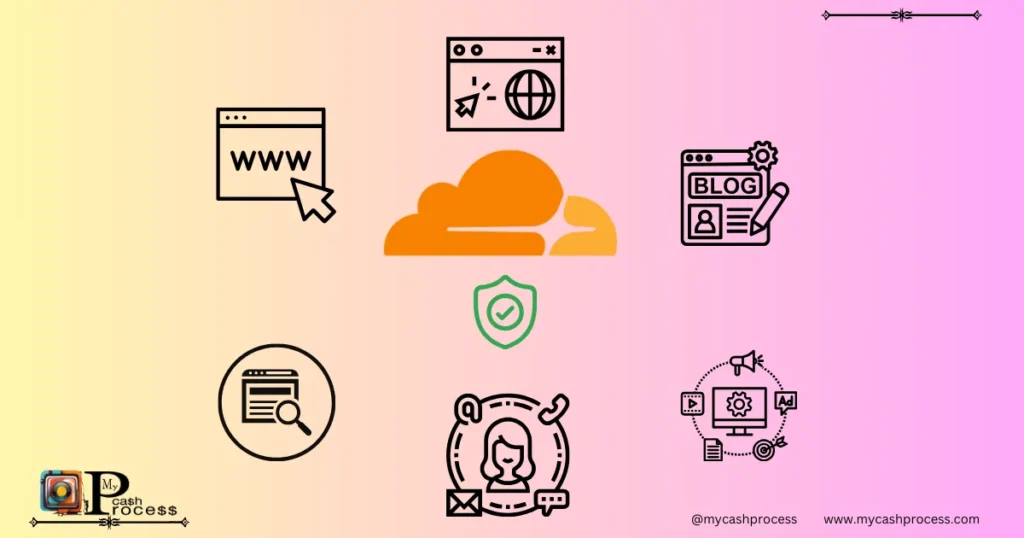
7. How to Install Cloudflare on Your Website for Free
Do you want to know How to Install Cloudflare on Your Website for Free; Installing Cloudflare website hosting is a relatively simple process, and the best part is that it’s free for most small websites. This section will walk you through a step-by-step guide to installing Cloudflare on a WordPress website for free.
Step-by-Step Guide to Installing Cloudflare on Your WordPress Website for Free
- Sign Up for Cloudflare:
- Visit the Cloudflare website and create a free account. If you already have an account, simply log in.
- Add Your Website to Cloudflare:
- Once logged in, click on the “Add a Site” button. Enter your website’s domain name (e.g., example.com), and Cloudflare will begin scanning your DNS records.
- Select a Plan:
- Choose the free plan (Cloudflare offers a range of paid plans, but the free plan is sufficient for basic website protection). This plan includes security features like SSL, DDoS protection, and basic website optimization.
- Update DNS Records:
- After selecting your plan, Cloudflare will provide a set of nameservers. You’ll need to log in to your domain registrar (where you bought your domain name) and replace the current nameservers with the ones provided by Cloudflare.
- Wait for DNS Propagation:
- DNS changes may take some time to propagate across the internet, typically 24-48 hours. Once the DNS records have been updated, Cloudflare will begin protecting your website.
- Configure Cloudflare Settings:
- After the installation process is complete, you can log into the Cloudflare dashboard to adjust settings for optimal performance and security. Enable features like SSL encryption, DDoS protection, and caching to improve your website’s security and speed.
Important Settings to Configure for Maximum Security
- Enable “Always Use HTTPS”:
- This feature forces all visitors to your website to access it via HTTPS, ensuring that data transmission is encrypted.
- Activate Web Application Firewall (WAF):
- Turn on Cloudflare’s WAF to block harmful traffic and filter out malicious requests before they reach your website.
- Enable Bot Protection:
- Use Cloudflare’s bot protection features to mitigate malicious bot traffic and prevent content scraping or brute-force attacks.
- Configure Security Level:
- Set the security level to high to block malicious visitors and bots from accessing your website.
Troubleshooting Common Issues During Installation
- DNS Issues: Sometimes DNS changes can take longer to propagate. If you experience delays in activation, wait for a few hours and check again.
- SSL Errors: If you encounter SSL issues after setting up Cloudflare, ensure that your website is configured to use Cloudflare’s SSL settings.
8. Post-Installation: Optimizing Cloudflare Settings for Maximum Security
Once Cloudflare website hosting is installed, it’s important to continuously optimize its settings to maintain robust website security. This section will provide guidance on the best settings to ensure your site remains secure and optimized after Cloudflare installation.
Recommended Cloudflare Settings for Better Security
- Enable Full SSL Mode:
- SSL encryption is a fundamental part of website security. Enable the “Full SSL” option in Cloudflare to encrypt traffic between your origin server and Cloudflare’s edge servers.
- Activate Auto Minify:
- To improve website performance without compromising security, enable Auto Minify for HTML, CSS, and JavaScript. This reduces file sizes and speeds up loading times.
- Use Security Headers:
- Configure HTTP security headers like Strict-Transport-Security (HSTS), X-Content-Type-Options, and X-XSS-Protection to protect your website from specific types of attacks.
- Enable Rate Limiting:
- Cloudflare offers rate limiting to prevent abuse by limiting the number of requests from a particular IP address. This is especially useful to prevent brute-force attacks and malicious bot traffic.
How to Ensure Your Site Stays Secure and Optimized After Installing Cloudflare
- Regular Security Audits:
- Conduct regular security audits to ensure your website’s security posture remains strong. Review your Cloudflare settings periodically to make sure they are up to date.
- Monitor Traffic:
- Use Cloudflare’s analytics tools to monitor traffic on your website. Look for any unusual activity or spikes in traffic that could indicate a potential threat.
- Use Cloudflare’s Additional Security Tools:
- Cloudflare website hosting provides additional security tools like Rate Limiting, Bot Fight Mode, and Access Rules that further enhance your website’s security.
9. Warning: Potential Risks and Misconfigurations
While Cloudflare website hosting offers a robust suite of security features, it’s important to be aware of potential risks and misconfigurations that could compromise the protection of your website. Implementing Cloudflare properly is crucial to maintaining its security benefits. In this section, we’ll examine common risks and offer tips on how to avoid them to ensure your website remains secure.
Risks of Improper Cloudflare Website Hosting Configuration
- DNS Misconfiguration:
- One of the most common issues when setting up Cloudflare is improper DNS configuration. If the DNS records are not properly updated or misdirected, visitors might not be able to access your site, or the website could be exposed to direct attacks bypassing Cloudflare protection. It’s essential to double-check the nameserver settings and ensure that Cloudflare’s nameservers are properly set in your domain registrar’s control panel.
- SSL/TLS Configuration Errors:
- Cloudflare’s SSL service can be a bit tricky if not set up correctly. Misconfigurations, like using the wrong SSL mode (e.g., Flexible SSL instead of Full SSL), can lead to incomplete encryption or SSL errors. This can negatively impact user trust and security. For maximum security, always opt for Full SSL (strict) to ensure end-to-end encryption.
- Firewall Misconfigurations:
- While Cloudflare website hosting includes a robust Web Application Firewall (WAF), misconfiguring firewall rules can inadvertently block legitimate traffic or leave your site vulnerable. For example, overly strict firewall rules might prevent some users from accessing your website, while not strict enough rules could let malicious traffic through. Be sure to customize your firewall rules based on your website’s needs.
- Overlooking Cloudflare’s Rate Limiting Features:
- Rate Limiting is one of the powerful features provided by Cloudflare to protect against brute-force attacks and other malicious behavior. Failing to enable Rate Limiting can leave your website susceptible to attacks that involve excessive requests from specific IP addresses or bots. Be sure to set limits for key endpoints (such as login pages) to mitigate such risks.
How to Avoid Security Gaps After Setting Up Cloudflare
- Review Cloudflare Settings Regularly:
- As your website grows and evolves, your Cloudflare settings should be reviewed and adjusted accordingly. Regularly audit your Cloudflare settings to ensure that they align with your evolving needs. For example, as your website traffic grows, you may need to adjust the caching rules or enable additional security features.
- Enable Web Application Firewall (WAF):
- Cloudflare’s WAF is a powerful tool that can block a wide variety of attacks, such as SQL injection, cross-site scripting (XSS), and other common threats. Ensure that WAF is activated and customized according to your site’s specific needs. Additionally, ensure that the WAF is regularly updated to protect against new vulnerabilities.
- Activate Automatic HTTPS Rewrites:
- If your website is transitioning to HTTPS, enabling the Automatic HTTPS Rewrites option in Cloudflare will ensure that all HTTP links are automatically redirected to HTTPS. This eliminates mixed-content issues, where some resources are still loaded over HTTP, leading to potential security vulnerabilities.
- Utilize Access Rules:
- Cloudflare allows you to set access rules for blocking or allowing traffic from specific countries, IP addresses, or regions. This can be particularly useful for blocking malicious traffic or specific known bad IP addresses. Take advantage of these rules to further safeguard your website.
Common Pitfalls and How to Resolve Them
- Caching Issues:
- After implementing Cloudflare, you might encounter caching issues where certain content on your website is not updated in real-time. To resolve this, clear the cache regularly or set appropriate cache expiration times for critical pages. Additionally, make use of the Cache-Control headers to dictate how long specific resources should be cached by Cloudflare.
- Bot Traffic and CAPTCHA Challenges:
- Cloudflare offers protection against bots, but some legitimate users may occasionally be mistakenly flagged as bots and asked to complete CAPTCHA challenges. This could frustrate your users. To avoid this, adjust the security level in Cloudflare’s settings, fine-tune the bot management system, and whitelist trusted IP addresses to reduce the frequency of CAPTCHA challenges.
- Not Leveraging Cloudflare’s Analytics Tools:
- Cloudflare provides valuable analytics on the traffic hitting your website, including threats, performance metrics, and request types. Failure to regularly review these reports may result in missed security threats. Make sure to actively monitor Cloudflare analytics to identify and respond to potential threats in real time.
10. Advice: Best Practices for Website Security with Cloudflare
To ensure that your website remains secure and optimized, it’s essential to follow best practices for website security when using Cloudflare website hosting. In this section, we will share key tips and strategies to enhance your website’s security while making the most of Cloudflare’s features.
Top Tips for Securing Your Site Using Cloudflare Features
- Use Strong Passwords and Two-Factor Authentication (2FA):
- Protect your Cloudflare account with strong, unique passwords and enable two-factor authentication (2FA). This adds an extra layer of security to your account, ensuring that only authorized users can access your Cloudflare settings.
- Enable DNSSEC:
- DNSSEC (Domain Name System Security Extensions) adds an additional layer of protection to your domain’s DNS. Enabling DNSSEC in Cloudflare prevents DNS spoofing and ensures the integrity of your DNS records.
- Regular Security Audits:
- Conduct regular security audits on your Cloudflare website hosting configuration and your website’s overall security. Review all settings, especially your firewall rules, DNS records, and SSL certificates to ensure there are no vulnerabilities.
- Use Cloudflare’s CDN for Performance and Security:
- Cloudflare CDN is an excellent tool not only for boosting performance but also for improving security. By caching your website’s content at Cloudflare’s global network, you can protect your site from potential threats, and it also speeds up load times for users around the world.
- Monitor Threat Analytics:
- Regularly monitor Cloudflare’s threat analytics to detect any abnormal behavior or malicious attempts on your website. Use these insights to fine-tune your security settings and prevent future attacks.
Follow us on Pinterest, Twitter X, Facebook, Instagram, Quora, TikTok, Discord, YouTube, and WhatsApp Channel.
Regular Updates and Monitoring for Maximum Security
- Patch Vulnerabilities:
- Always keep your website’s software and plugins up to date. This applies to your CMS (like WordPress) as well as any other third-party tools integrated into your site. Cloudflare website hosting offers tools to protect against many attacks, but regular software updates ensure that you are protected against newly discovered vulnerabilities.
- Backup Your Website:
- While Cloudflare offers excellent protection, it’s still crucial to have regular backups of your website data. In case of an emergency, you can quickly restore your site to its previous state without any downtime.
- Utilize Cloudflare’s Additional Security Tools:
- In addition to the basic security features, Cloudflare offers advanced security tools such as Bot Management and Access Rules to further protect your website from advanced threats. Leverage these tools to ensure a comprehensive security strategy.
FAQs: Common Questions About Cloudflare Website Hosting
Here are some frequently asked questions that website owners often have when considering Cloudflare website hosting:
What is Cloudflare website hosting and how does it protect my site?
Cloudflare website hosting is a platform that provides website protection and optimization through a global network of servers. It acts as a reverse proxy, filtering malicious traffic before it reaches your site and improving site performance through caching and CDN services.
Can I use Cloudflare for free, and what’s the benefit of doing so?
Yes, Cloudflare offers a free plan that provides essential features like DDoS protection, SSL encryption, and website performance optimization. This free plan is ideal for small websites looking for basic security and performance improvements.
How do websites using Cloudflare CDN in Canada benefit from the service?
Websites using Cloudflare CDN in Canada benefit from faster loading times, enhanced security, and protection against local and international cyber threats. Cloudflare offers servers in Canadian data centers, improving latency and providing better overall performance for Canadian users.
How do I ensure my WordPress site is secure with Cloudflare?
To secure your WordPress site with Cloudflare, install the Cloudflare plugin, configure SSL settings, enable DDoS protection, and optimize your site’s security settings in Cloudflare’s dashboard. Use Cloudflare’s WAF to block malicious traffic and monitor your site’s security regularly.
Conclusion: Enhancing Your Website’s Security with Cloudflare
In conclusion, Cloudflare website hosting is an essential tool for website owners who want to enhance their site’s security and performance. By implementing Cloudflare, website owners can protect against DDoS attacks, optimize performance through its CDN, and ensure SSL encryption for secure data transfer. With its easy integration process and robust security features, Cloudflare is an invaluable resource for anyone looking to improve their site’s protection against cyber threats.
As online threats continue to evolve, Cloudflare remains one of the most effective solutions for safeguarding websites and ensuring optimal performance. Investing in Cloudflare website hosting is a proactive measure to secure your site and ensure it remains accessible and protected for your users.
Note: Always stay updated with the latest security practices and regularly monitor your Cloudflare configuration to adapt to new threats and technological advancements.

